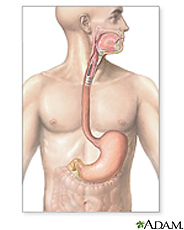 |
 |
 |
Other Health Topics:

-
Related Topics
-
Go Local
- Services and providers for Swallowing Disorders in the U.S.
-
National Institutes of Health
- The primary NIH organization for research on Swallowing Disorders is the National Institute on Deafness and Other Communication Disorders
Languages
- Chinese - Simplified (简体中文)
- Chinese - Traditional (繁體中文)
- French (français)
- Hindi (हिन्दी)
- Japanese (日本語)
- Korean (한국어)
- Russian (Русский)
- Somali (af Soomaali)
- Spanish (español)
- Ukrainian (Українська)
If you have a swallowing disorder, you may have difficulty swallowing and may also have pain while swallowing. Some people may be completely unable to swallow or may have trouble swallowing liquids, foods or saliva. This makes it hard to eat. Often, it can be difficult to take in enough calories and fluids to nourish your body.
Anyone can have a swallowing disorder, but it is more likely in the elderly. Swallowing problems often happen because of other conditions, including
- Nervous system disorders, such as Parkinson's disease and cerebral palsy
- Problems with your esophagus, including gastroesophageal reflux disease (GERD)
- Stroke
- Head or spinal cord injury
- Cancer of the head, neck, or esophagus
Medicines can help some people, while others may need surgery. Swallowing treatment with a speech-language pathologist can help. You may find it helpful to change your diet or hold your head or neck in a certain way when you eat. In very serious cases, people may need feeding tubes.
National Institute on Deafness and Other Communication Disorders
-
Dysphagia
 (National Institute on Deafness and Other Communication Disorders)
(National Institute on Deafness and Other Communication Disorders)
-
Swallowing Disorders
 (National Institute of Neurological Disorders and Stroke) - Short Summary
(National Institute of Neurological Disorders and Stroke) - Short Summary
| Basics | Learn More | Multimedia & Cool Tools |
|---|---|---|
|
||
| Research | Reference Shelf | For You |
-
Overviews
- Difficulty Swallowing(Mayo Foundation for Medical Education and Research)
- Swallowing Trouble(American Academy of Otolaryngology--Head and Neck Surgery)
-
Diagnosis/Symptoms
- Diagnosis of Swallowing Problems(Mayo Foundation for Medical Education and Research)
-
Upper Endoscopy
 (National Institute of Diabetes and Digestive and Kidney Diseases)
(National Institute of Diabetes and Digestive and Kidney Diseases)
-
Specific Conditions
- Oromandibular Dystonia (Cranial Dystonia)(Dystonia Medical Research Foundation)
- Swallowing Problems After Head and Neck Cancer(American Speech-Language-Hearing Association)
-
Related Issues
- Esophageal Spasms(Mayo Foundation for Medical Education and Research)
-
Anatomy/Physiology
-
Your Digestive System and How It Works
 (National Institute of Diabetes and Digestive and Kidney Diseases)
(National Institute of Diabetes and Digestive and Kidney Diseases)
Also available in Spanish
-
Your Digestive System and How It Works
-
Clinical Trials
-
ClinicalTrials.gov: Deglutition Disorders
 (National Institutes of Health)
(National Institutes of Health)
-
ClinicalTrials.gov: Deglutition Disorders
-
Research
- Can Thickened Liquids or Chin-Down Posture Prevent Aspiration?(American College of Physicians)
-
Journal Articles
References and abstracts from MEDLINE/PubMed (National Library of Medicine)
- Article: Diagnostic evaluation of dysphagia.
- Article: Speech and swallowing disorders in Parkinson disease.
- Article: Clinical implications of respiratory-swallowing interactions.
- Swallowing Disorders -- see more articles
- Medical Encyclopedia Return to top
-
Directories
- Find a Professional: Online Directory of Audiology and Speech-Language Pathology Programs(American Speech-Language-Hearing Association)
- Find an Otolaryngologist (ENT)(American Academy of Otolaryngology--Head and Neck Surgery)
-
Organizations
- American Speech-Language-Hearing Association
-
National Institute on Deafness and Other Communication Disorders

-
Children
- Dysphagia (in Children)(Children's Hospital Boston)
- Feeding and Swallowing Disorders in Children(American Speech-Language-Hearing Association)
| Home | Health Topics | Drugs & Supplements | Encyclopedia | Dictionary | News | Directories | Other Resources | |
| Disclaimers | Copyright | Privacy | Accessibility | Quality Guidelines U.S. National Library of Medicine, 8600 Rockville Pike, Bethesda, MD 20894 National Institutes of Health | Department of Health & Human Services |
Date last updated: 23 July 2008 Topic last reviewed: 12 July 2008 |






